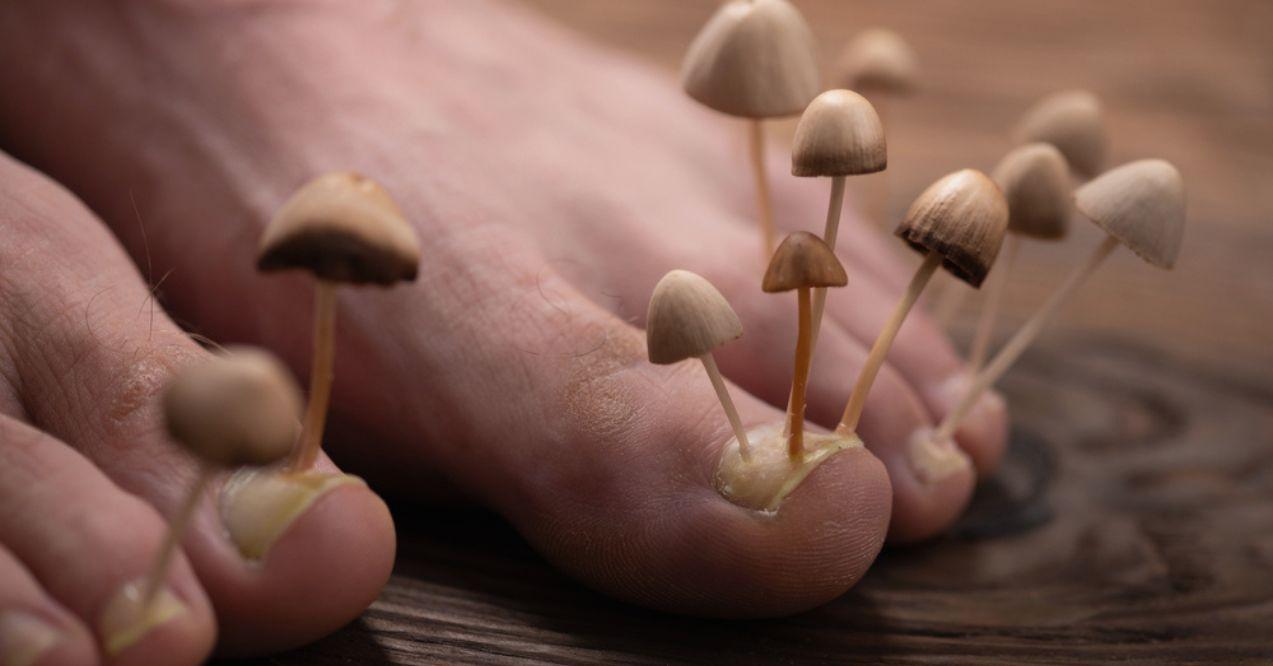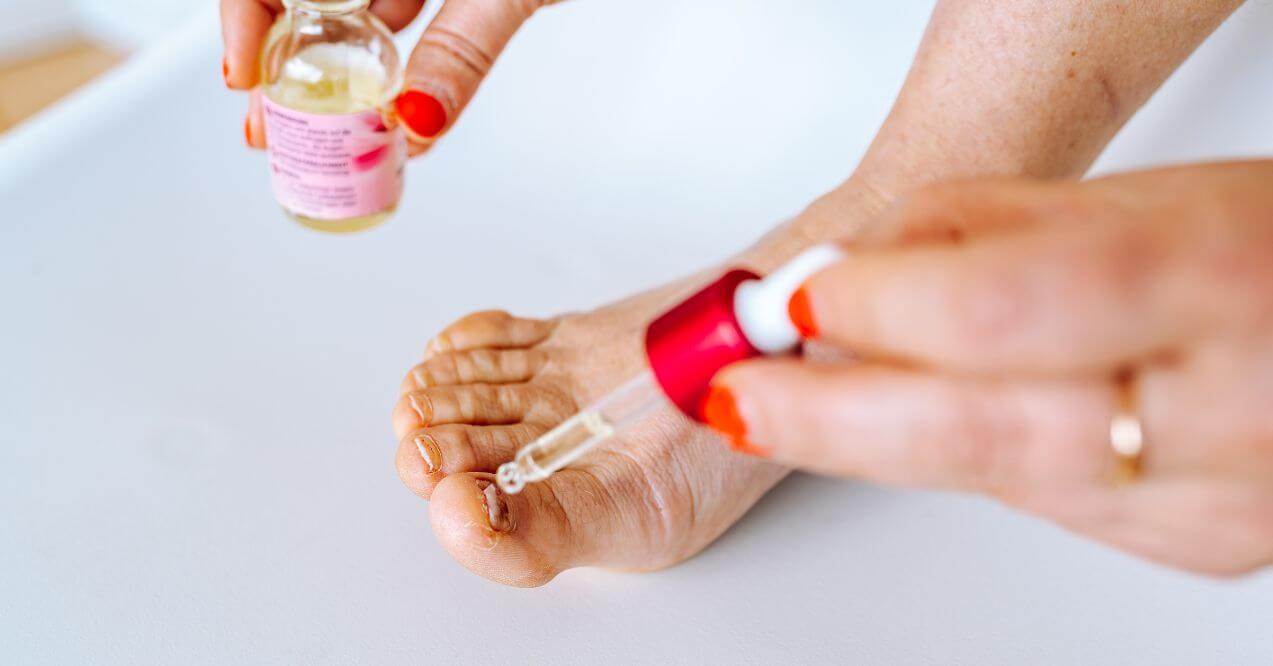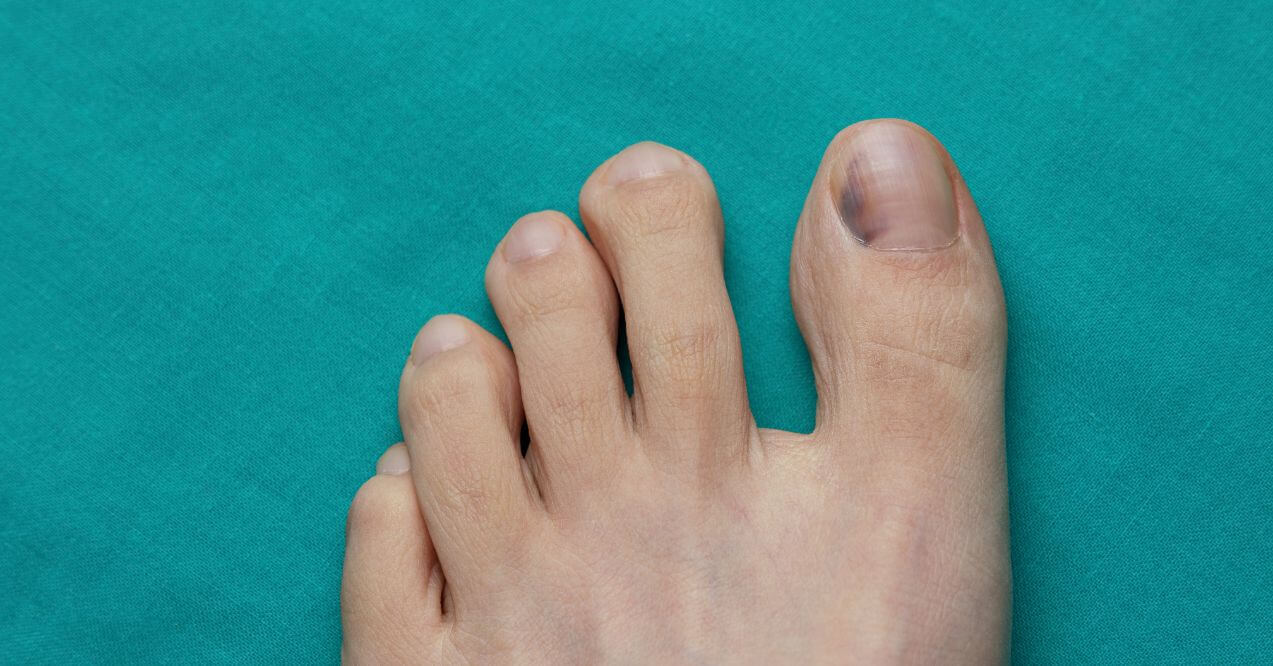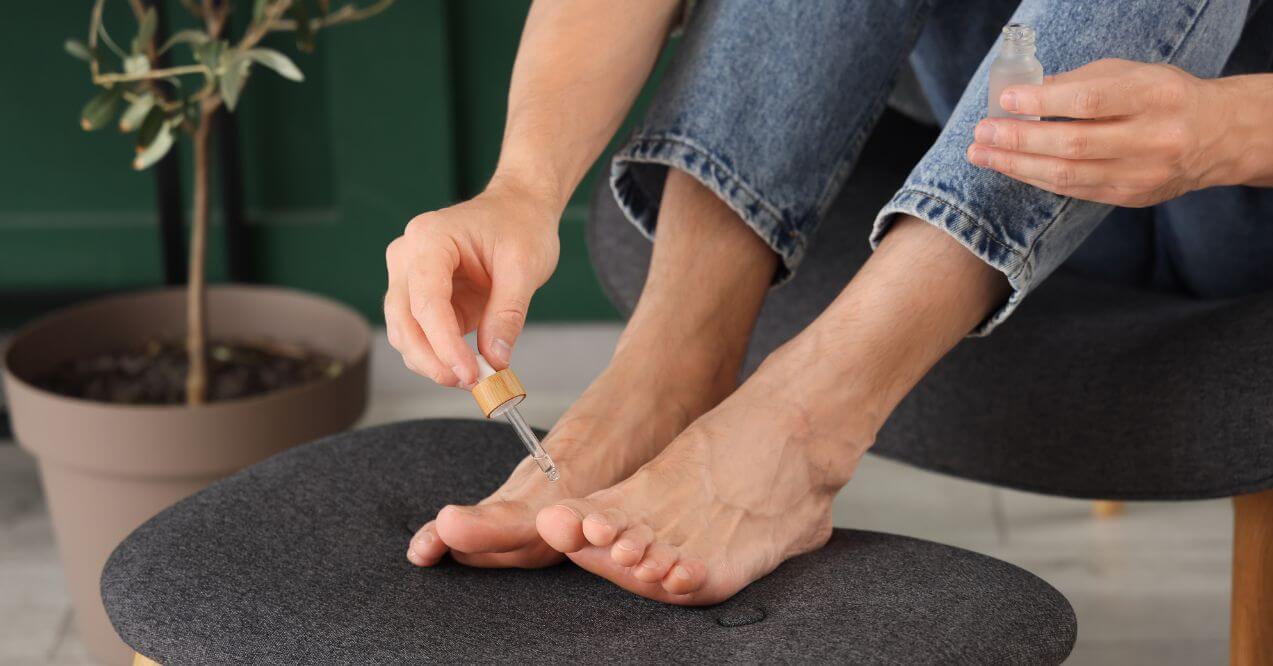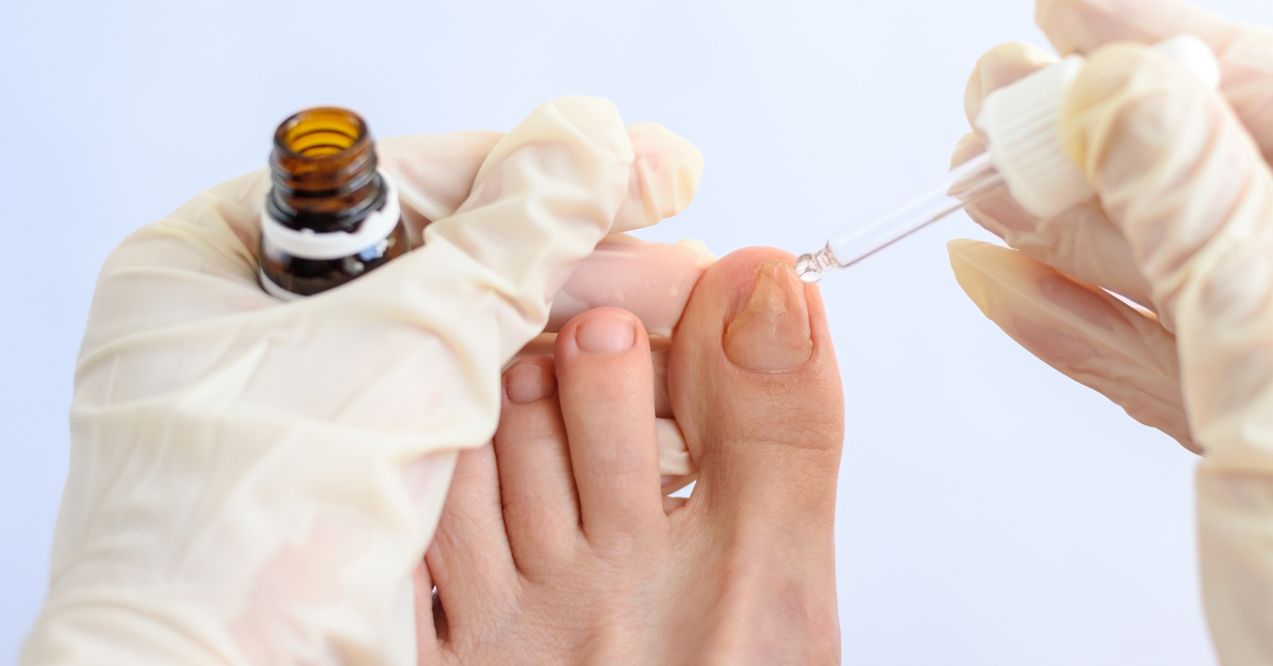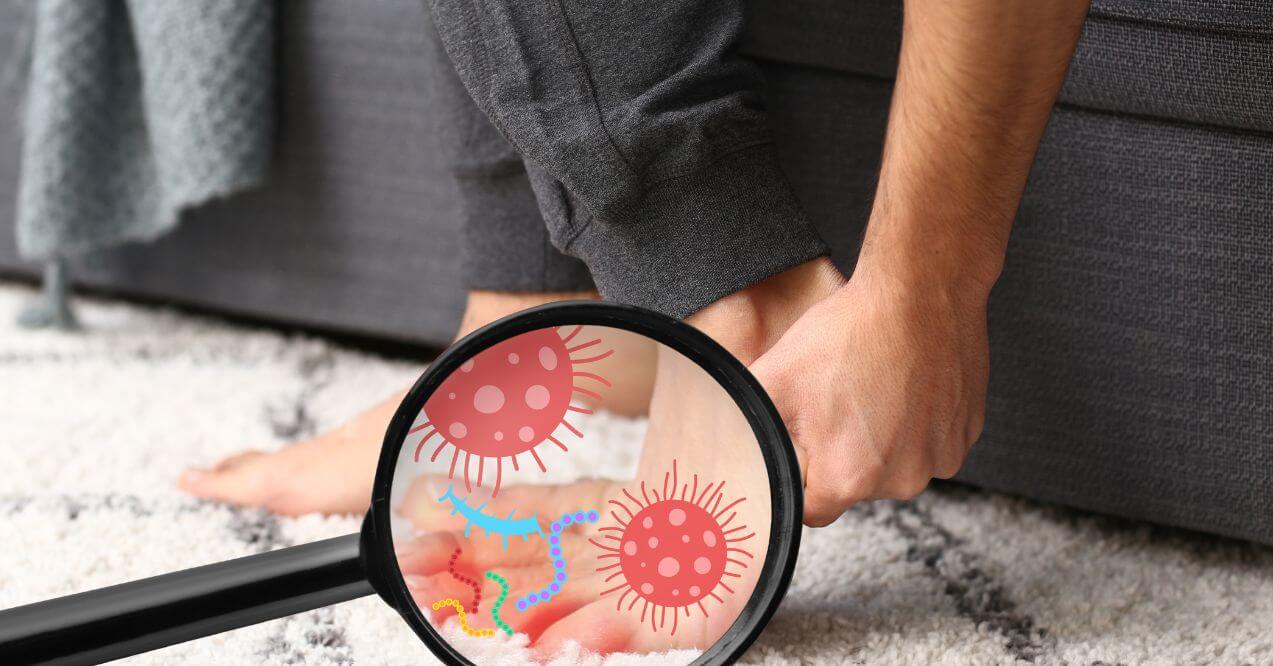Is Nail Fungus Contagious? Risks & Treatment Tips
Medically reviewed by our experts
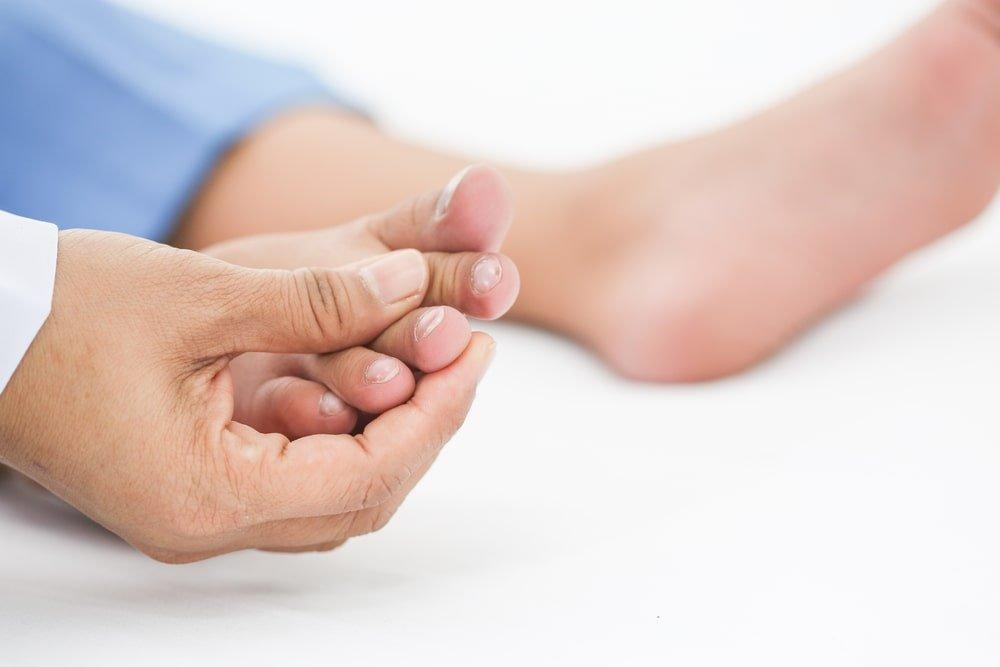

Is nail fungus contagious? Fungus is usually something associated with mushrooms growing in wet, dark areas. However, there are many types of fungus, including several strains that cause serious infections in the toenails. Interestingly enough, contagious toenail fungus also thrives in moist, dark places without a great deal of air—like shoes.
Many people who have been afflicted with nail fungus don’t want to talk about it because they think it’s embarrassing, but the fact is that it’s quite common and easily treatable, especially if the infection is caught early. Dermatophytes, the strains of fungus that cause infection, are common in certain places, but they can be picked up anywhere.
Is nail fungus contagious? Unfortunately, yes. Is it also treatable? Yes. Furthermore, it’s preventable, as most contagious infections are. You simply need to know how it spreads to be able to protect yourselves, as well as how to prevent giving it to others if you’re infected yourself.
Is Nail Fungus Contagious and Can it Spread?
How contagious is toenail fungus? Very. Anyone can pick up toenail fungus that can turn into an infection. However, certain populations are more sensitive. Furthermore, if they develop an early-stage toenail fungus infection, it can get serious more quickly, as well as affect other health conditions. If any of the following apply to you, take extra care.
- Circulation problems
- Diabetes
- Already-injured nails
- Lowered immunity or an auto-immune condition
- If you are older than 65
- Psoriasis
- If you have acrylics or artificial nails
Another consideration when thinking, “is nail fungus contagious?” is if you wear tight-fitting or non-breathable shoes for a good majority of the day. This environment for your feet is a breeding ground for fungus. Sometimes situations like this can’t be avoided, though, so you can take extra measures to counteract the effects.
- If your shoes have a breathable alternative, wear those instead.
- Choose breathable socks or mesh stockings that allow airflow.
- Don’t wear the same shoes two days in a row. Switch them out to allow breathing time.
- Take your shoes off whenever you can, like at lunch under your desk.
- Keep nails clean and cut short, but take care not to cut your nails too short, which will make them susceptible to germs.
Is toenail fungus contagious from a nail salon? The answer to this one is yes, too. Most salons are reputable and sanitize their equipment properly, but you can never be too careful. If anyone with a contagious toenail fungus has been in that chair or had their nails serviced with that equipment, it could spread to you if proper cleaning measures weren’t taken.
Before you start your appointment, ask your technician to show you how they sanitize instruments between clients. If they can’t show you or don’t know, choose a different salon. You could also read reviews to see if anyone else has had issues there in the past. You could avoid the issue altogether by bringing your own supplies.
Identifying a Nail Fungus
There are several signs and symptoms of contagious toenail fungus as well as different types of toenail fungus that you can watch out for, especially if you fall into one of the susceptible populations. If and when you see any of these, make an appointment with your doctor right away so that the problem doesn’t become severe.
- Discolored nails, often with a yellow or brownish tinge
- Brittle, cracked, or crumbling toenails
- Toenails that grow misshapen or at an odd angle
- A foul-smelling odor coming from underneath the nail
- Nails that hurt or are painful when touched
- Toenails that become loose from the nailbed or are lifted
Your toenails aren’t the only nails that can become infected with fungus, either! The nails on your hands are just as susceptible. About one in ten people experience some type of contagious foot fungus at some point in their lives.
Once people enter their senior years, this number skyrockets to over half. This is because as we age, our toenails naturally become thinner and more brittle, making them open to infections.
Since circulation problems, diabetes, and immune conditions are also more likely in the senior years, it’s even more important that people over 65 see a doctor immediately if they notice any of the above signs or symptoms.
Remember, there are plenty of ways to make picking up a contagious toenail fungus much less likely. No matter your age, lifestyle, or health condition, implement these practices to ensure that your feet are kept healthy and safe.
- Wear breathable shoes and socks and/or give your feet breaks throughout the day.
- Don’t wear the same pair of shoes two days in a row.
- Never share shoes, socks, or hygiene items for feet.
- Always wear shower shoes around the pool, in public bathrooms and showers, in saunas, and anywhere that other people’s feet touch.
- If a family member has toenail fungus, wear shower shoes until it’s cleared, or clean the floor of the shower or bath after each use.
- Always wash your hands after touching anything that came into contact with an infected foot.
- Give your nails a break after using polish or artificial nails.
- Keep your toenails (and fingernails) clean and short.
Toenail Fungus Treatments
Fortunately, toenail fungus is treatable. You should see a doctor right away if you notice the signs of early toenail fungus. Then, you’ll be able to get ahead of the situation before it becomes any worse. The treatments are often simple, but they can take quite a while to completely clear the fungus from your body. The longer the infection has been present, the more time treatment can take.
There are a few ways to get rid of toenail fungus. These include internal medications, topical creams, and toenail removal.
- Antibiotics and Antifungal Pills – Depending on the strain of the infection, your doctor might prescribe a particular antibiotic to take each day. Additionally, it could be beneficial to consider integrating one of the toenail fungus supplements. These will cure the infection from the inside. However, your doctor must take a sample of the nail or a small amount of scrapings to determine exactly what strain of fungus you have. Antibiotics and the like aren’t one-size-fits-all. If the one you take isn’t made particularly for the fungus you have, you might be ruining your gut flora without killing the infection. Therefore, make sure to see your doctor.

- Topical Creams – If your infection hasn’t progressed to late-stage contagious foot fungus, you could possibly use a topical fungal cream or a polish-like substance to put over your infected nails each day. This will work to cure the infection from the outside. If you’re susceptible to nail fungus, or if you are frequently in an area where it might be present, it might be good to keep one of these on hand in case you see early signs and symptoms. Talk to your doctor to see if this is a good option for you.
- Rubbing alcohol – Applying alcohol to the infected area can help reduce the growth of the fungus, as alcohol dries out and disinfects the nail, creating an environment where fungi struggle to thrive. However, using alcohol to kill the fungus should only be used in combination with other treatments recommended by a doctor.
- Toenail Removal – Unfortunately, some cases are quite severe and too far gone to respond to either of the above treatments. If this is the case, your doctor will let you know their procedure and what options there are to treat the pain during removal. Sometimes, your toenail may even grow back once the fungus is completely gone from your body. To ensure this, your doctor might also prescribe antibiotics to make sure that the fungus doesn’t return.
After trying any of these treatments you probably want to know if it helped. Read our article on how to know if toenail fungus is dying and make sure you are treating it right!
Final Thoughts
Toenail fungus isn’t something to be ashamed of. Everyone has fungus that naturally grows on their feet and in their shoes! It’s only particular types (dermatophytes) that eventually turn into an infection. Thankfully, there are plenty of things you can do to keep your feet safe from the fungus that causes contagious toenail infections.
Toenail fungus is just as contagious as other types of foot fungus. All fungal infections of the foot, including athlete’s foot (tinea pedis), thrive in similar conditions and can be passed from person to person or through contaminated surfaces. The contagious nature of these fungi means that good hygiene and preventive measures are essential to avoid infection.
The risk of catching toenail fungus from a nail salon is present if the salon does not practice proper sterilization techniques for their tools and equipment. If a previous client had a fungal infection and the instruments were not properly sanitized, the fungus can be transmitted to another person. Always ensure that the salon follows strict hygiene practices or consider bringing your own set of tools for personal safety.
To prevent the spread of contagious foot fungus, practice good foot hygiene by keeping your feet clean and dry, wear breathable footwear, change socks regularly, and avoid going barefoot in public places like locker rooms or pools. Also, do not share personal items like towels, shoes, or nail clippers, and sanitize any pedicure tools before use. If you have a fungal infection, treat it promptly to reduce the risk of spreading it to others.
Popular Articles
Advertisement. This site offers health, wellness, fitness and nutritional information and is designed for educational purposes only. You should not rely on this information as a substitute for, nor does it replace, professional medical advice, diagnosis, or treatment. If you have any concerns or questions about your health, you should always consult with a physician or other health-care professional. Do not disregard, avoid or delay obtaining medical or health related advice from your health-care professional because of something you may have read on this site. The use of any information provided on this site is solely at your own risk.




